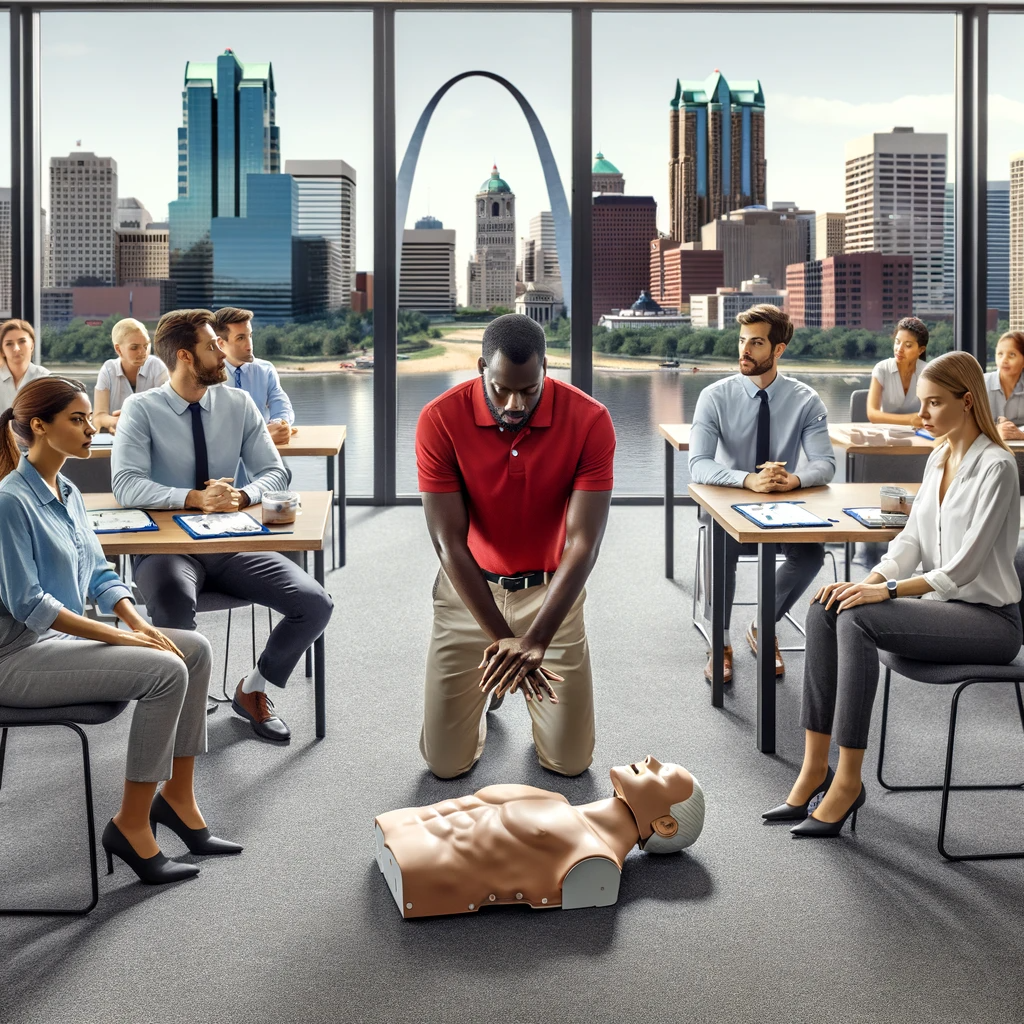
Before we talk about CPR classes St Louis MO, imagine a colleague suddenly collapsing at work. Panic ensued as everyone felt utterly helpless… except for one individual who had undergone CPR training. They stepped forward immediately and began administering chest compressions.
Thanks to their knowledge and quick action, they survived. Learning CPR is not merely a skill—it’s empowering! It can genuinely be the difference between life and death.
Let’s explore everything you need for CPR classes St Louis MO. We’ll guide you where to go, how to select top-notch classes, and explain why it holds such significance.
Table of Contents
- Understanding the Importance of CPR, AED, and First Aid Training
- Comprehensive Guide to Onsite CPR Classes in Saint Louis, MO
- Evaluating the Quality of CPR Classes St Louis MO
- Importance of Regular Refresher Courses
- Comparing Major Brands of AEDs
- Implementing AEDs in Your Business
- Legal and Ethical Considerations of CPR and AED Training
- FAQs about CPR Classes Saint Louis MO
- Conclusion
Understanding the Importance of CPR, AED, and First Aid Training
Safety at work is no laughing matter. Yet it’s like a fire extinguisher – you hope never to need it, but when an emergency hits, you’re grateful for its presence. We strongly advocate that businesses prioritize CPR, AED, and First Aid training.
The unexpected can happen at times. A co-worker might choke on their lunch, or someone could suffer a heart attack during a meeting. Though unpleasant, cardiac arrests occur more frequently than anticipated.
According to the AHA, sudden cardiac arrest is a reality in the US, occurring every two minutes.
CPR (Cardiopulmonary Resuscitation) helps maintain blood flow to vital organs until professional help arrives, while an AED (Automated External Defibrillator) restores regular heartbeat during cardiac arrests. Early use of both techniques can increase survival rates by over 50%. Now, that’s worth considering.
And First Aid? The initial response to various injuries and medical conditions can make all the difference between minor setbacks and significant health consequences.
So, don’t leave safety up to chance. Equip your team with the skills they need through First Aid, CPR, and AED training because it is always better to be prepared than sorry.
Comprehensive Guide to Onsite CPR Classes in Saint Louis, MO
If you’re searching for top-notch CPR certification classes in Saint Louis, MO, you’ve come to the right place at EMC CPR & Safety Training. From downtown lofts to suburban office parks, safety knows no boundaries.
American Heart Association (AHA) Programs
The American Heart Association offers a variety of courses for healthcare professionals, ranging from Basic Life Support (BLS) training to more advanced cardiac life support (ACLS). Classes include hands-on sessions taught by American Heart Association instructors, giving attendees the skills and confidence they need when seconds count.
AHA certifications are valid for two years. But don’t forget about refresher courses – keeping your knowledge up-to-date is vital.
American Red Cross (ARC) Courses
American Red Cross provides comprehensive First Aid/CPR/AED programs for anyone with little or no medical training. You’ll learn how to recognize emergencies and make appropriate decisions.
Developed by the Red Cross Scientific Advisory Council, you can choose between classroom-based training or blended simulation learning options that combine online coursework with practical skill sessions.
Health & Safety Institute’s Mediated Learning Experience
The Health & Safety Institute (HSI)‘s approach includes instructor-led discussions and interactive video presentations – like Netflix but lifesaving.
- Earn a 2-year certification after demonstrating competent performance during skill evaluations.
- Pick from a wide array of first aid components based on your needs.
Evaluating the Quality of CPR Classes St Louis MO
When you’re looking for a CPR class, quality matters. But how do you measure that? To determine quality, here are some elements to take into account.
Instructor Qualifications
The instructor’s qualifications can indicate the quality of a course. Look for certifications from recognized organizations like the American Heart Association (AHA), American Red Cross (ARC), or Health & Safety Institute (HSI). These groups have rigorous standards, so an instructor certified by them is likely well-trained.
Course Content and Practical Sessions
A good CPR class should cover both theory and practical skills. It’s not enough to know what to do – you need hands-on practice, too. Ensure the course includes opportunities to use an AED, perform first aid procedures, and learn lifesaving techniques such as chest compressions and rescue breaths.
Bonus Tip: Class Size Matters Too.
You might think bigger classes give more value, but smaller classes often provide better instruction because they allow instructors more time with each student. Remember – when saving someone’s life, there isn’t room for guesswork or confusion. Choose wisely.
Importance of Regular Refresher Courses
“If you don’t regularly keep up with these techniques, they can become forgotten.” CPR, AED use, and First Aid skills are no different. They can fade away if you don’t regularly practice these lifesaving techniques.
The American Heart Association recommends a refresher skills training course every two years to keep your knowledge sharp and skills honed. But why wait so long? With the ever-changing medical field, more frequent refreshers might be better.
Maintaining Up-to-Date Knowledge
New studies come out all the time, altering our understanding of how best to respond in an emergency. Regular refresher courses ensure I feel bothered when you are armed with the latest knowledge.
This isn’t just about remembering steps but being confident enough to spring into action when needed – because, let’s face it – during emergencies, there’s no room for doubt.
Honing Practical Skills
Knowing what to do is one thing; doing it right under pressure is another ball game altogether. The hands-on training component of regular refresher courses lets you rehearse those crucial moves repeatedly until they become second nature during the skills session.
You’ll get feedback on everything from hand placement while performing chest compressions in CPR to how quickly (and accurately) you can use an AED device or apply bandages correctly in First Aid situations.
Achieving Better Outcomes During Emergencies
Studies show that the survival rates for cardiac arrest victims are directly proportional to the speed and effectiveness of CPR administered. So, by staying current with your training, you’re not just improving yourself – you could be helping save a life.
Regular refresher courses aren’t an option but a necessity in this ever-evolving world. It’s about being ready when it counts most.
Important Takeaway:
Keeping your CPR, AED use, and First Aid skills sharp with regular refresher courses isn’t just a recommendation—it’s crucial. Not only does it keep you updated on the latest emergency response techniques, but it also helps build confidence to act swiftly in emergencies. With hands-on training and real-time feedback, these courses ensure that lifesaving steps become second nature to you.
Comparing Major Brands of AEDs
The market for Automated External Defibrillators (AEDs) is vast, but three brands stand out: Cardiac Science’s Powerheart G3 Plus, ZOLL’s AED Plus, and the Philips HeartStart FRx.
Cardiac Science’s Powerheart G3 Plus: This device uses clear voice prompts to guide you through each step. But what sets it apart is its automatic shock delivery – if it detects an irregular heartbeat, it will deliver shocks without human intervention.
ZOLL’s AED Plus: This brand gives visual and audio prompts and provides real-time feedback on your CPR performance with its Real CPR Help technology. If you’re pressing too soft or too fast during chest compressions, ZOLL will let you know.
Philips HeartStart FRx: Designed with simplicity at its core, the HeartStart FRx is all about easy use. It has clear voice instructions and an intuitive interface that even a first-time user can navigate without trouble.
When it comes to cost, there is some variation among these brands. The Powerheart G3 Plus tends to be pricier than the ZOLL AED Plus or Philips HeartStart FRx. However, it offers features like automatic shock delivery that may justify the higher price for certain businesses.
These brands have a track record of performing exceptionally well and consistently proving their worth. You can trust them to deliver reliable performance when it matters most.
Implementing AEDs in Your Business
Choosing Automated External Defibrillators (AEDs) at your workplace is a step towards ensuring safety. But how do you get started? It’s more than buying an AED and putting it on a wall.
A Strategic Placement Plan
To start with, make sure your AED is accessible within seconds. The American Heart Association recommends that defibrillation occur within 3-5 minutes of cardiac arrest for the best chance of survival.
This means placing them near high-traffic areas or where strenuous activity happens. Stairwells, cafeterias, gyms – these are all great spots.
Training Your Staff
An AED is only effective if staff are trained to recognize when it should be used and how to operate it. Training should cover operating the device and recognize when it’s needed.
We recommend enrolling staff in CPR/AED training programs offered by reputable organizations such as American Heart Association (AHA), American Red Cross (ARC), or Health & Safety Institute (HSI). They provide theory and practical sessions, which can prove vital during emergencies.
Regular Maintenance
An AED isn’t a set-it-and-forget-it device. Regular upkeep is critical to make sure it’s available when required.
It’s crucial to ensure your batteries are charged, the pads aren’t expired, and the device has no damage or wear. Although most AEDs run self-checks and will give a heads-up if something needs fixing, don’t rely solely on this feature.
Legal and Ethical Considerations of CPR and AED Training
The laws around CPR, AED use, and first aid training can seem like a maze. Grasping the regulations surrounding CPR, AED use, and first aid instruction is essential to ensuring your organization remains compliant with legal and moral limits.
Importance of Consent
In an emergency, consent might not be top of mind. However, it’s crucial in most cases before providing care. Unless someone is unconscious or unable to respond due to their condition, implied consent comes into play.
Navigating Liability Issues
A common question businesses ask: “What if we do something wrong during a rescue attempt?” The answer lies within Good Samaritan Laws. These protect individuals who act in good faith while giving reasonable assistance during emergencies from being sued for negligence.
This protection doesn’t mean you can ignore proper training, though. Making sure employees have up-to-date certifications reduces the chance they’ll make mistakes when using life-saving techniques or equipment like AEDs.
The Good Samaritan Law Explained
Good Samaritan Laws vary by state, but generally, these statutes protect people acting in good faith without expecting compensation while helping at accident scenes or medical emergencies. In Missouri, where St Louis resides, this law protects rescuers unless there’s evidence of gross negligence. Missouri Revised Statutes Section 537-037.
FAQs about CPR Classes Saint Louis MO
How much does it cost to get CPR certified in Missouri?
The cost for a CPR certification course in Missouri can range from $50 to $100, depending on the provider and type of course.
How long does a CPR certification card last in Missouri?
In Missouri, your CPR certificate typically lasts for two years. After this period, you must renew your skills with a refresher course.
How much does it cost to get CPR certified in Georgia?
In Georgia, getting a valid CPR certification might set you back anywhere between $45 and $95 based on the training center’s rates.
How much does it cost to get CPR certified in Florida?
CPR courses are priced around $60-$120 in Florida. However, prices can vary depending on the specific class and institution offering the training.
Conclusion
Being prepared is powerful. We’ve discovered that while exploring CPR classes St Louis MO.
The significance of this education can’t be downplayed—it could save someone’s life!
You now understand how to evaluate class quality and how refresher courses keep your skills sharp.
AEDs are essential, too, right? And implementing them effectively into businesses could mean all the difference during an emergency.
And let’s not forget about legal and ethical considerations—they’re essential for smooth operation and peace of mind.
Check out our other blogs at https://www.emccprtraining.com/blog/.
Contact us at www.emccprtraining.com/contact or 800-695-5655 to learn about our onsite CPR/AED training and AED sales.


